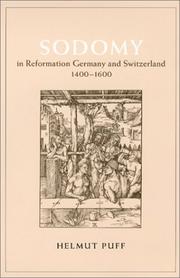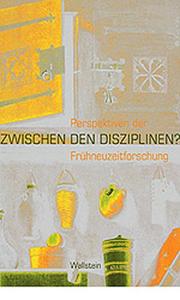| Listing 1 - 10 of 13 | << page >> |
Sort by
|

ISBN: 0226685063 9780226685069 0226685055 Year: 2003 Volume: *9 Publisher: Chicago University of Chicago Press
Abstract | Keywords | Export | Availability | Bookmark
 Loading...
Loading...Choose an application
- Reference Manager
- EndNote
- RefWorks (Direct export to RefWorks)
Homosexuality --- Sodomy --- Reformation --- History. --- Religious aspects. --- Switzerland --- Germany --- Intellectual life. --- Buggery --- Pederasty --- Sex crimes --- Homosexuality (in religion, folk-lore, etc.) --- Same-sex attraction --- Sexual orientation --- Bisexuality --- Religious aspects --- History --- Ethics of family. Ethics of sexuality --- anno 1400-1499 --- anno 1500-1599 --- Sociology of the family. Sociology of sexuality
Book
ISBN: 311036834X 3110304090 9783110303858 311030385X 9783110304091 9783110368345 Year: 2014 Publisher: Berlin Boston
Abstract | Keywords | Export | Availability | Bookmark
 Loading...
Loading...Choose an application
- Reference Manager
- EndNote
- RefWorks (Direct export to RefWorks)
Miniature Monuments: Modeling German History offers a series of essays on small-scale models of bombed out cities. Created between 1946 and the present, these plastic renderings of places provide eerie glimpses of destruction and devastation resulting of the air war. This study thus permits fresh angles on post-war responses to the compounded losses of WW II, and it does so through considering these "miniature monuments" (of, among others, Frankfurt, Munich, Schwetzingen, Heilbronn and Hiroshima) in a deep cultural history that interlaces the sixteenth, eighteenth, and twentieth centuries. Three-dimensional renderings in diminutive size have rarely been subjected to rigorous theoretical reflection. Conventionally, models, whether of ruins or intact spaces, have been assumed to be "easily legible"; that is, they have been assumed to be vehicles of the authentic. Yet rubble and other models should be theorized as complex simulacra of abstract realities and catalysts of memories. Miniature Monuments thus tackles a haunting paradox: building ruins. The book elucidates how utterly contingent processes of crumbling and collapse (the English words for the Latin ruina) came to command such great interest in modern Europe that tremendous efforts were taken to uncover, render, and, most of all, recreate ruins.
Historiography --- Historical models. --- History --- Models, Historical --- Models and modelmaking --- Models --- Methodology --- Historiographie --- Modèles historiques --- German history. --- cultural history. --- memory. --- ruins. --- urban history.
Book
ISBN: 9783110553017 3110553015 Year: 2014 Publisher: Berlin: de Gruyter,
Abstract | Keywords | Export | Availability | Bookmark
 Loading...
Loading...Choose an application
- Reference Manager
- EndNote
- RefWorks (Direct export to RefWorks)
Book
ISBN: 3525014236 Year: 1993 Publisher: Zürich : Vandenhoeck und Ruprecht,
Abstract | Keywords | Export | Availability | Bookmark
 Loading...
Loading...Choose an application
- Reference Manager
- EndNote
- RefWorks (Direct export to RefWorks)
Homosexuality in literature. --- Homosexuality --- Social aspects.
Book
ISBN: 9781503637023 9781503635418 Year: 2023 Publisher: Stanford Stanford University Press
Abstract | Keywords | Export | Availability | Bookmark
 Loading...
Loading...Choose an application
- Reference Manager
- EndNote
- RefWorks (Direct export to RefWorks)
"Helmut Puff invites readers to visit societies and spaces of the past through the lens of a particular temporal modality: waiting. From literature, memoirs, manuals, chronicles, visuals, and other documents, Puff presents a history of waiting anchored in antechambers - interior rooms designated and designed for people to linger. In early modern continental Western Europe, antechambers became standard in the residences of the elites. As a time-space infrastructure these rooms shaped encounters between unequals. By imposing spatial distance and temporal delays, antechambers constituted authority, rank, and power. Puff explores both the logic and the experience of waiting in such formative spaces, showing that time divides as much as it unites, and that far from what people have said about early moderns, they approached living in time with apprehensiveness. Unlike how contemporary society primarily views the temporal dimension, to early modern Europeans time was not an objective force external to the self but something that was tied to acting in time. Divided only by walls and doors, waiters sought out occasions to improve their lot. At other times, they disrupted the scripts accorded them. Situated at the intersection of history, literature, and the history of art and architecture, this wide-ranging study demonstrates that waiting has a history that has much to tell us about social and power relations in the past and present"--
European literature --- Waiting (Philosophy) in literature --- Entrance halls in literature --- Time in literature --- Space in literature --- Themes, motives

ISBN: 3892446288 Year: 2003 Publisher: Göttingen Wallstein
Abstract | Keywords | Export | Availability | Bookmark
 Loading...
Loading...Choose an application
- Reference Manager
- EndNote
- RefWorks (Direct export to RefWorks)
Civilization, Modern --- Interdisciplinary research --- Europe --- Historiography --- Intellectual life
Multi
ISBN: 9781847888020 9781845207021 9781847888006 9781847888013 9781847888037 9781847888044 9781847888051 1845207025 1847888003 1847888011 184788802X 1847888038 1847888046 1847888054 Year: 2011 Volume: 6 Publisher: Oxford Berg
Abstract | Keywords | Export | Availability | Bookmark
 Loading...
Loading...Choose an application
- Reference Manager
- EndNote
- RefWorks (Direct export to RefWorks)
Renaissance --- Ethics of family. Ethics of sexuality --- History of civilization --- sexuality --- anno 1400-1499 --- anno 1500-1599 --- Sex --- Sexual Behavior --- Homosexuality --- Sexually Transmitted Diseases --- Prostitution --- Social aspects --- History --- history --- History. --- 392.6 <09> --- Seksualiteit. Seksueel leven. Concubinaat. Samenwonen. Prostitutie. Erotiek. Seksuele gebruiken. Liefdeskunst--Geschiedenis van ... --- 392.6 <09> Seksualiteit. Seksueel leven. Concubinaat. Samenwonen. Prostitutie. Erotiek. Seksuele gebruiken. Liefdeskunst--Geschiedenis van ... --- Sex Work --- Sex customs --- Vie sexuelle --- history. --- Histoire --- Seksualiteit. Seksueel leven. Concubinaat. Samenwonen. Prostitutie. Erotiek. Seksuele gebruiken. Liefdeskunst--Geschiedenis van .. --- Seksualiteit. Seksueel leven. Concubinaat. Samenwonen. Prostitutie. Erotiek. Seksuele gebruiken. Liefdeskunst--Geschiedenis van . --- Seksualiteit. Seksueel leven. Concubinaat. Samenwonen. Prostitutie. Erotiek. Seksuele gebruiken. Liefdeskunst--Geschiedenis van --- Sex - Social aspects - History --- Sex - history --- Sexual Behavior - history --- Homosexuality - history --- Sexually Transmitted Diseases - history --- Prostitution - history
Book
ISBN: 9781442630376 144263037X Year: 2017 Publisher: Toronto, Ont. University of Toronto Press
Abstract | Keywords | Export | Availability | Bookmark
 Loading...
Loading...Choose an application
- Reference Manager
- EndNote
- RefWorks (Direct export to RefWorks)
"Contrary to the historiographical commonplace "no Reformation without print" Cultures of Communication examines media in the early modern world through the lens of the period's religious history. Looking beyond the emergence of print, this collection of ground-breaking essays highlights the pivotal role of theology in the formation of the early modern cultures of communication. The authors assembled here urge us to understand the Reformation as a response to the perceived crisis of religious communication in late medieval Europe. In addition, they explore the novel demands placed on European media ecology by the acceleration and intensification of global interconnectedness in the early modern period. As the Christian evangelizing impulse began to propel growing numbers of Europeans outward to the Americas and Asia, theories and practices of religious communication had to be reformed to accommodate an array of new communicative constellations across distances, languages, cultures."--
Intercultural communication --- Communication --- Mass media --- Theology --- Reformation. --- 284 --- Cross-cultural communication --- Culture --- Cross-cultural orientation --- Cultural competence --- Multilingual communication --- Technical assistance --- Protestant Reformation --- Reformation --- Church history --- Counter-Reformation --- Protestantism --- Christian theology --- Theology, Christian --- Christianity --- Religion --- Communication (Theology) --- 284 Protestantisme. Protestantse sekten --- 284 Protestantisme. Sectes protestantes --- Protestantisme. Protestantse sekten --- Protestantisme. Sectes protestantes --- History --- Religious aspects --- Christianity. --- Anthropological aspects --- History of civilization --- History of Europe --- anno 1500-1599 --- Mass communication --- Media, Mass --- Media, The --- Communication, Primitive --- Sociology --- Religious aspects&delete&
Book
ISBN: 1282255606 9786613814968 0857453742 0857459376 0857453734 0857459384 Year: 2012 Publisher: New York : Berghahn Books,
Abstract | Keywords | Export | Availability | Bookmark
 Loading...
Loading...Choose an application
- Reference Manager
- EndNote
- RefWorks (Direct export to RefWorks)
Michel Foucault's seminal The History of Sexuality (1976-1984) has since its publication provided a context for the emergence of critical historical studies of sexuality. This collection reassesses the state of the historiography on sexuality-a field in which the German case has been traditionally central. In many diverse ways, the Foucauldian intervention has governed the formation of questions in the field as well as the assumptions about how some of these questions should be answered. It can be argued, however, that some of these revolutionary insights have ossified into dogmas
Homosexuality --- Gay men --- Lesbians --- Sex --- History --- Gender (Sex) --- Human beings --- Human sexuality --- Sex (Gender) --- Sexual behavior --- Sexual practices --- Sexuality --- Sexology --- Female gays --- Female homosexuals --- Gay females --- Gay women --- Gayelles --- Gays, Female --- Homosexuals, Female --- Lesbian women --- Sapphists --- Women, Gay --- Women homosexuals --- Gays --- Women --- Gays, Male --- Homosexuals, Male --- Male gays --- Male homosexuals --- Urnings --- Men --- Same-sex attraction --- Sexual orientation --- Bisexuality
Book
ISBN: 9780857453730 9780857459374 Year: 2012 Publisher: New York Berghahn
Abstract | Keywords | Export | Availability | Bookmark
| Listing 1 - 10 of 13 | << page >> |
Sort by
|

 Search
Search Feedback
Feedback About UniCat
About UniCat  Help
Help News
News